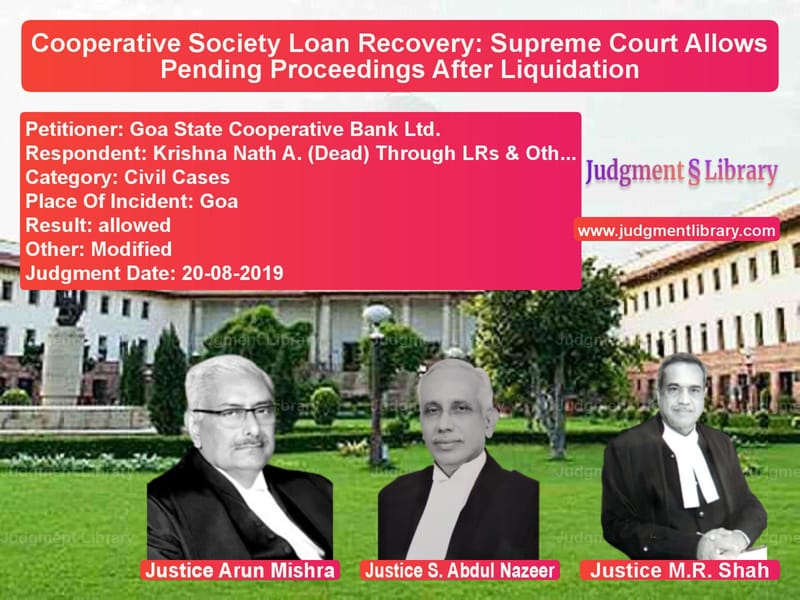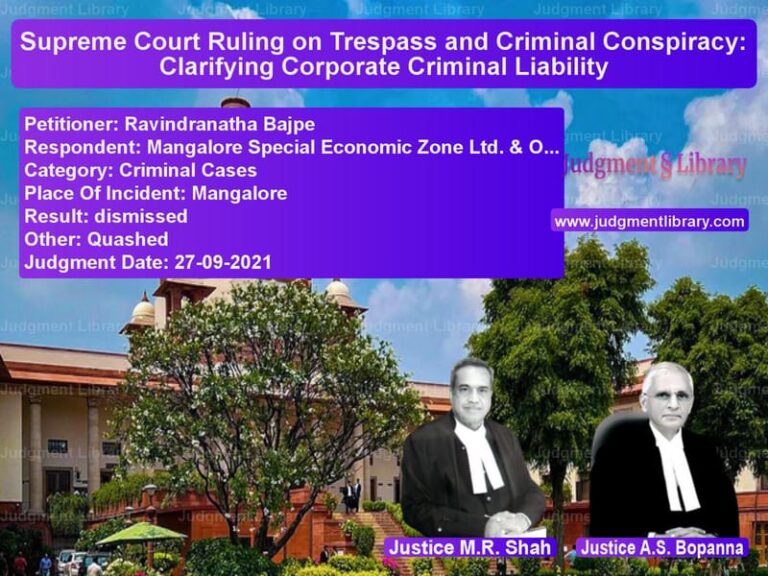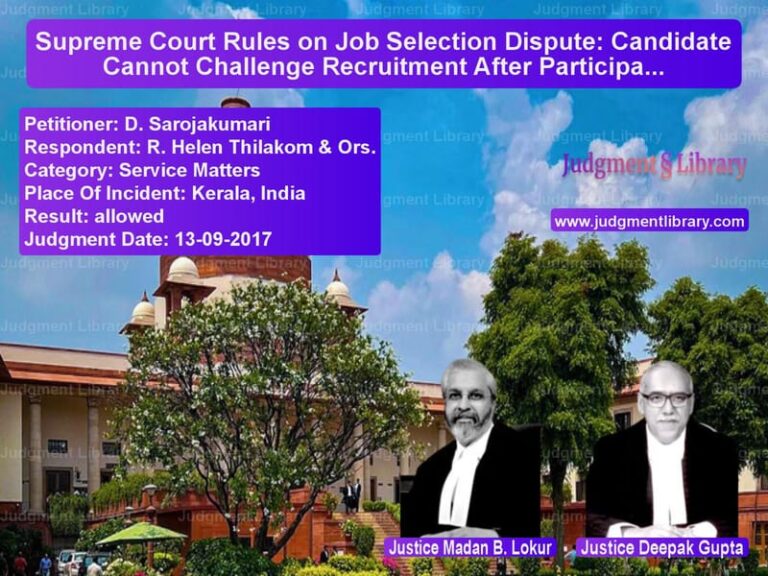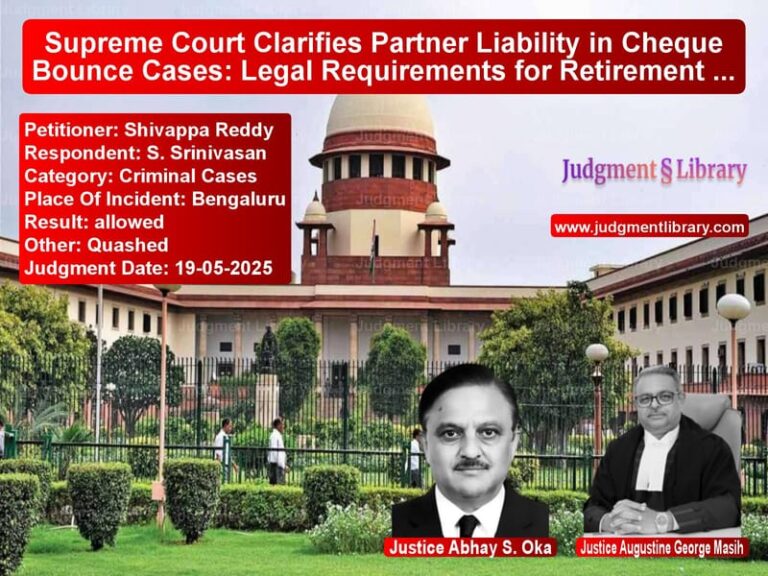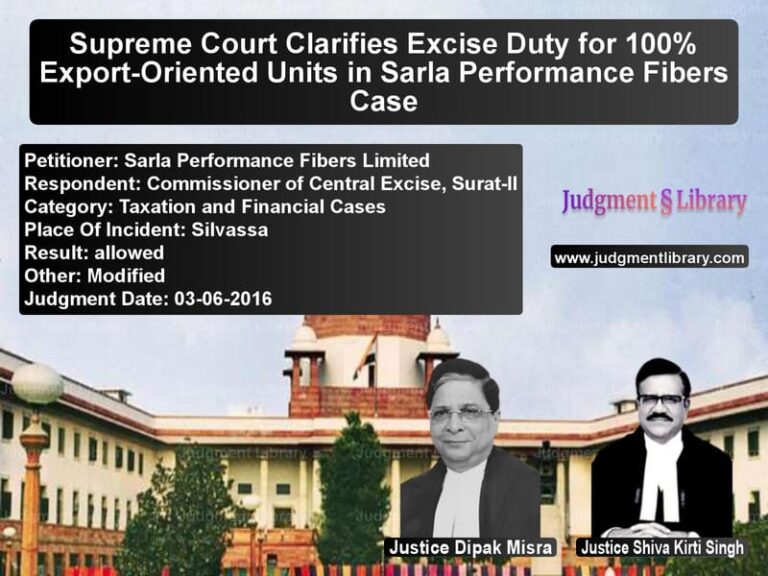Cooperative Society Loan Recovery: Supreme Court Allows Pending Proceedings After Liquidation
The case of Goa State Cooperative Bank Ltd. v. Krishna Nath A. (Dead) Through LRs & Others pertains to a significant legal question regarding the liquidation of cooperative societies and the recovery of outstanding loans from its members. The Supreme Court had to decide whether loan recovery proceedings could continue after the expiry of the liquidation period under Section 109 of the Maharashtra Cooperative Societies Act, 1960.
Background of the Case
The case involves the Goa State Cooperative Bank Ltd., which was the liquidator of Goa, Daman & Diu Cooperative Fisheries Federation Limited (hereinafter referred to as “the Society”). The Society was registered under the Maharashtra Cooperative Societies Act and was formed to promote fisheries and improve the socio-economic conditions of fishermen by providing financial assistance.
Between 1974 and 1980, the Society advanced loans totaling Rs. 316 lakhs to its members for purchasing fishing boats and equipment, using funds raised from the Goa State Cooperative Bank Ltd. However, severe financial irregularities were found in loan disbursement, leading to the winding-up order against the Society in 1985.
The liquidation process continued for several years with different liquidators being appointed, but loan recoveries remained incomplete. In 1995, the Goa State Cooperative Bank Ltd. was appointed as the liquidator to ensure the recovery of the outstanding dues. The Bank filed 156 recovery cases against defaulting members, and while some recoveries were made, significant amounts remained unpaid due to pending litigation and court stays.
In 2001, one of the defaulting members filed a writ petition before the Bombay High Court at Goa, arguing that, under Section 109 of the Maharashtra Cooperative Societies Act, the liquidation process must terminate within ten years, and all proceedings should be deemed closed. The High Court accepted this argument and ruled that the liquidation proceedings stood terminated with retrospective effect from 1993.
The Goa State Cooperative Bank Ltd. challenged the High Court’s ruling before the Supreme Court.
Key Issues Before the Supreme Court
- Whether Section 109 of the Maharashtra Cooperative Societies Act mandates an absolute termination of all proceedings after ten years of liquidation.
- Whether loan recovery proceedings can continue after the expiry of the liquidation period.
- Whether the High Court erred in directing the closure of all liquidation-related proceedings retrospectively.
Arguments of the Parties
Appellant (Goa State Cooperative Bank Ltd.):
- The High Court erred in ruling that the liquidation process must terminate completely after ten years, as loan recovery is a separate issue.
- Loan recovery proceedings against defaulting members must continue beyond the liquidation period to safeguard public funds.
- Many recovery proceedings were delayed due to court-imposed stays, which should not allow defaulters to escape their liabilities.
- The liquidation period should not be interpreted in a way that defeats the purpose of recovering outstanding loans.
Respondents (Defaulting Members & Legal Representatives of Krishna Nath A.):
- Under Section 109 of the Maharashtra Cooperative Societies Act, liquidation must be completed within ten years, beyond which all proceedings must be deemed closed.
- Once the liquidation period expires, the liquidator loses authority to recover outstanding loans.
- The High Court correctly ruled that liquidation proceedings should be deemed terminated as per the law.
Supreme Court’s Observations
The Supreme Court examined the relevant provisions of the Maharashtra Cooperative Societies Act, particularly Section 109, which states that liquidation must be completed within six years, extendable up to a maximum of ten years. However, the Court emphasized that the intent of the law was not to terminate loan recovery proceedings automatically.
“It is apparent that on the termination of the liquidation proceedings, liability of the members for the debts taken by them does not come to an end. There is no such provision in the Act providing once winding-up period is over, the liability of the members for loans obtained by them shall come to an end.”
The Court further clarified that loan recovery proceedings should continue beyond the liquidation period, particularly when delays were caused by litigation:
“When there is stay of proceedings by a court, no person can be made to suffer for no fault on his part, and a person who has liability cannot be permitted to reap the advantages on the basis of interim orders of the court.”
Final Judgment
The Supreme Court overturned the High Court’s ruling and allowed the Goa State Cooperative Bank Ltd. to continue pending recovery proceedings:
“We hold that the appellant bank can continue the pending proceedings. The appeal is allowed to the aforesaid extent.”
The Court also directed that the registrar should notify creditors and other stakeholders about the continuation of recovery proceedings.
Key Takeaways from the Judgment
- Loan recovery proceedings do not automatically terminate upon the completion of the liquidation period.
- Defaulters cannot escape liability due to delays caused by litigation or court stays.
- The provisions of Section 109 of the Maharashtra Cooperative Societies Act must be interpreted in a way that allows for the continued realization of outstanding dues.
- The liquidation period is distinct from the recovery process, and the latter can continue even after the former ends.
Implications of the Judgment
This ruling has significant implications for cooperative societies, financial institutions, and creditors. It ensures that defaulters cannot misuse procedural time limits to evade repayment of loans. It also provides clarity on the interplay between liquidation proceedings and recovery actions, preventing the misuse of technical legal provisions to escape financial liabilities.
Conclusion
The Supreme Court’s decision in this case reinforces the principle that public funds should be safeguarded, and loan defaulters must not be allowed to evade repayment due to procedural loopholes. By allowing recovery proceedings to continue beyond the liquidation period, the ruling ensures accountability and upholds the financial integrity of cooperative institutions.
Petitioner Name: Goa State Cooperative Bank Ltd..Respondent Name: Krishna Nath A. (Dead) Through LRs & Others.Judgment By: Justice Arun Mishra, Justice S. Abdul Nazeer, Justice M.R. Shah.Place Of Incident: Goa.Judgment Date: 20-08-2019.
Don’t miss out on the full details! Download the complete judgment in PDF format below and gain valuable insights instantly!
Download Judgment: Goa State Cooperativ vs Krishna Nath A. (Dea Supreme Court of India Judgment Dated 20-08-2019.pdf
Direct Downlaod Judgment: Direct downlaod this Judgment
See all petitions in Debt Recovery
See all petitions in Bankruptcy and Insolvency
See all petitions in Judgment by Arun Mishra
See all petitions in Judgment by S. Abdul Nazeer
See all petitions in Judgment by Mukeshkumar Rasikbhai Shah
See all petitions in allowed
See all petitions in Modified
See all petitions in supreme court of India judgments August 2019
See all petitions in 2019 judgments
See all posts in Civil Cases Category
See all allowed petitions in Civil Cases Category
See all Dismissed petitions in Civil Cases Category
See all partially allowed petitions in Civil Cases Category

